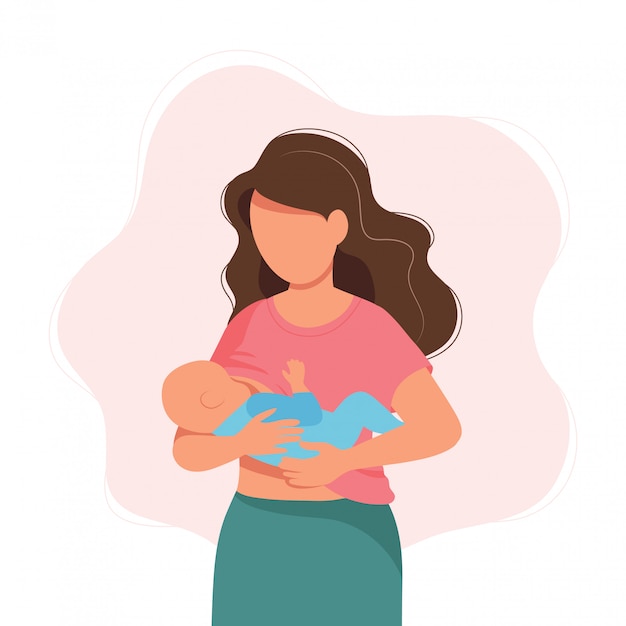Breastfeeding makes babies healthier
Published date 27/01/2021
According to Children’s Hospital 1
World Breastfeeding Week was launched in 1990 by the World Health Organization and the United Nations Children’s Organization (UNICEF) and is celebrated on August 1-7 every year in over 170 countries around the world. to promote breastfeeding and improve the health and nutritional status of children worldwide.

Breast milk is the source of “love vaccine” to help children prevent disease
Breast milk in the early days contains a lot of protein. In which, 50% of the protein content is immunoglobulins (mainly IgA), which are effective against pathogenic bacteria and viruses. These antibodies are located in the intestinal tract and work against pathogenic bacteria, block viruses and neutralize toxins. For about the first 2 months, breast milk is considered an effective vaccine for the weak body of the baby.
As a result of valuable research work carried out by the London School of Hygiene and Tropical Diseases in collaboration with the Kintampo Health Research Center of Ghana and the Johns Hopkins Bloomberg School of Public Health and the Nutritional Intervention Project, Nepal, Sarlahi (NIPS) have shown that early breastfeeding within the first hour of birth can help prevent neonatal mortality due to infectious diseases such as sepsis, pneumonia and diarrhea bleeding and prevent other hypothermia-related deaths by providing the infant with immune factors in colostrum. Breastfeeding immediately after birth ensures that the infant receives the first drops of milk (colostrum), which is the first “vaccine” for the baby. Colostrum protects babies from disease by providing immune factors as well as anti-inflammatory and bactericidal substances.
Breastfed babies (at least the first 6 months) can avoid the risk of many acute and chronic diseases such as diarrhea, respiratory infections, otitis media, pneumonia… Because breast milk contains immunoglobulins. Breast milk contains lactoferrin, an iron-binding protein that prevents the growth of certain harmful bacteria. The presence of natural nutrients nucleotides in breast milk with levels of 69-72mg/l helps to strengthen resistance to infections such as diphtheria, meningitis. Studies conducted in Sweden and the UK show that breastfed babies during the first year are less likely to suffer from diseases such as obesity, atherosclerosis and high blood pressure.
The United Nations Children’s Fund (UNICEF) emphasizes that breastfeeding helps reduce mortality in children under 5 years of age. Specifically, there is a 13% reduction in the mortality rate of children under 5 years of age if in the first 6 months of life the child is exclusively breastfed, and continues to be supplemented with breast milk until the child turns 1 year old. According to the World Health Organization (WHO), “If all infants are breastfed for the first 6 months of life and receive adequate nutrition from breast milk until 2 years of age, we can save up to 1.5 million children’s lives every year.
Practical benefits for mothers when practicing breastfeeding
Since ancient times, breastfeeding has been a sacred and noble duty of women. In addition to nutritional value, breast milk also gives babies a very rich source of antibodies to help them stay healthy. It is a sad fact that breast-feeding is getting less and less attention, specifically in Vietnam, just in the past decade, the rate of exclusive breastfeeding “drops” catastrophically from 34 % (in 1998) to 19.6% (in 2010), while the value and benefits of breast milk remain unchanged, especially the very practical benefits for the mother.
– Helps mothers lose weight: mothers who breastfeed their babies daily will regain their original body weight faster than those who do not breastfeed their babies. Breastfeeding can help burn up to 1500 calories of energy in a day.
– Forging an emotional bond: Breastfeeding creates a very strong invisible bond between mother and baby, which is an emotion that all mothers consider strange and wonderful. At this stage, babies will receive all of their necessary minerals, nutrients and most of all, love from their mothers.
– Reduces cancer risk: Breastfeeding reduces a woman’s risk of most cancers such as breast, ovarian and cervical cancer as well as type 2 diabetes.Read More Breastfeeding also reduces the risk of anemia and helps prevent osteoporosis and bone fractures that are common in women after giving birth.
Give moms a chance to relax: Breastfeeding makes mothers feel happy because endorphins are released during breastfeeding. This leads to a pleasant feeling of euphoria or relaxation, giving the mother the opportunity to stop and enjoy the refreshment next to her little angel.
– Time saving and convenience: the nursing mother will save almost 8 hours in a week can use this time for rest and relaxation, because the mother will not have to spend time preparing for the baby. infant feedings. Breastfeeding is more convenient than bottle feeding. When moms are traveling, they don’t have to deal with the hassle of bottles, sterilizing bottles, and preparing time








